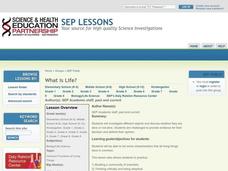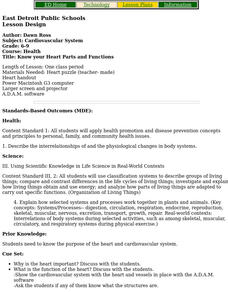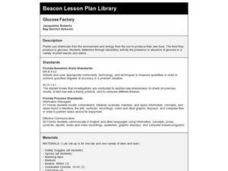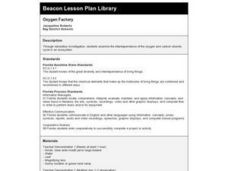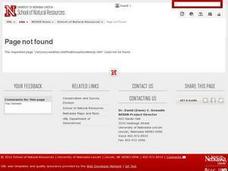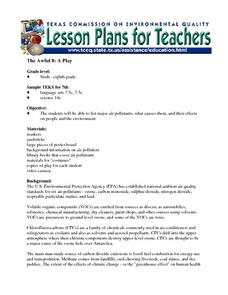Curated OER
Breathing
In this breathing worksheet, students will review vocabulary words and topics relating to the lungs and the parts of the breathing system in humans. Students will explore how exercise effects the carbon dioxide that is exhaled. This...
Curated OER
What is Life?
Students investigate the characteristics of living things. In this life science instructional activity, students examine several living and non-living specimens. Students determine which things are living and non-living.
Curated OER
Plant Detectives
Exploration of the school grounds and thought images are used to demonstrate the many uses of plants.
Curated OER
Making Blood!
students research blood's components, and use their math skills to recreate a model of whole blood using commonly found food items.
Curated OER
Water Purification
Students develop an understanding and appreciation of water purification techniques and their implications for health maintenance.
Curated OER
Stop the Bleeding
Students explore various parts of the heart and blood vessels . They begin with an overview of the components of the cardiovascular system. They see a cross section of an artery and watch how a blood clot develops.
Curated OER
Know your Heart Parts and Functions
Middle schoolers put together a 3-D interactive "heart" puzzle and learn the names of heart parts.
Curated OER
Glucose Factory
Fourth graders determine, through laboratory activity, the presence or absence of glucose in a variety of plant leaves and stems. They work in groups and perform a three part laboratory which shows them how plants convert sunlighht to food.
Curated OER
Oxygen Factory
Fourth graders examine the interdependence of the oxygen and carbon dioxide cycle in an ecosystem through a laboratory investigation. After a lecture/demo, 4th graders complete the lab in groups.
Curated OER
Teaching about Increased Conductivity: Are Culverts The Culprits?
Students encounter the complexity of identifying the cause of unusual variations in WOW conductivity data. They propose theories on why there was a sudden increase in conductivity in Ice Lake, Minnesota during July of 1998.
Curated OER
Water Quality and Dissolved Oxygen
Students investigate the relationship between dissolved oxygen and organic materials and aquatic organisms. This is a 3-lesson series in which students explore dissolved oxygen and then design an experiment testing the effects of changes.
Curated OER
Biochemical Cycles: Recycling Carbon and Nitrogen
Students construct flow diagrams of the carbon and nitrogen cycle processes. They identify sequences in each cycle that are affected by human impact and present their research to the class.
Curated OER
Curiosity Does Not Kill The Cat
Students list the different ways they could test a guinea pig, a dandelion, and their brother (or sister)? They create a data chart in their group that lists the organism, what they could measure, and how they could change that measurement.
Curated OER
Enzyme Lab
Students examine the effects of specific enzymes on samples of liver tissue, muscle tissue (chicken), apples, and potatoes.
Curated OER
Earth's Atmosphere and Temperature
Learners explore the layers of earth's atmosphere and conduct an experiment to identify carbon dioxide. They construct models using styrofoam to represent molecules in the atmosphere's layers. To discover how sunlight efffects...
Curated OER
Food Web Follies
Seventh graders cut and paste animal pictures to create a food web and trace the path of energy. They write a paragraph explaining the importance of photosynthesis in all food webs.
Curated OER
The Awful 8: A Play
Middle schoolers perform a play that presents the causes and effects on people and the environment of the eight major air pollutants.
Curated OER
Monitoring Oxygen Level
Students measure oxygen percentages in room air and air exhaled after they perform various activities. They explore various websites, and record and analyze the data from the experiments.
Curated OER
And The Beat Goes On...!
Students explore the circulatory system. They observe a dissection of a heart and view the path that blood takes through the heart and the circulatory system. Students identify the structures and functions of the heart. They write a...
Curated OER
Safety Scenarios
Young scholars discuss the various safety procedures and signs keeping them safe at work. In groups, students review several safety scenarios and present their suggests for a safe environment to the group. Young scholars practice using...
Curated OER
Bottled Model Lungs
Students will learn about the respiratory system by comparing and contrasting models, building their own models, and giving one another feedback. Questions about familiar body systems can be useful in getting students to start thinking...
Curated OER
The Awful Eight
Students investigate the concept of a carpool and its contributions to either reducing or increasing air pollution. They conduct research using a variety of resources for background information. The information is used to write a play...
Curated OER
Building a Circulation City
Young scholars identify the different organ systems found throughout the human body. Using a model, they explain and draw the flow of blood and name the parts of the circulatory system. They create their own circulation city in which...
Curated OER
The Global Impact of Insect Borne Diseases & Agriculture
Students study the global impact of insect borne diseases, the appropriate use of pesticides, and the concept of human interrelations on a world wide scale. They examine how to safely apply a pesticide, according to the label.
Other popular searches
- Cellular Respiration
- Plant Respiration
- Cell Respiration
- Photosynthesis & Respiration
- Aerobic Respiration
- Anaerobic Respiration
- Photosynthesis / Respiration
- Yeast Cellular Respiration
- Video Cellular Respiration
- Photosynthesis and Respiration
- Aerobic Cellular Respiration
- Cell Respiration Lab



